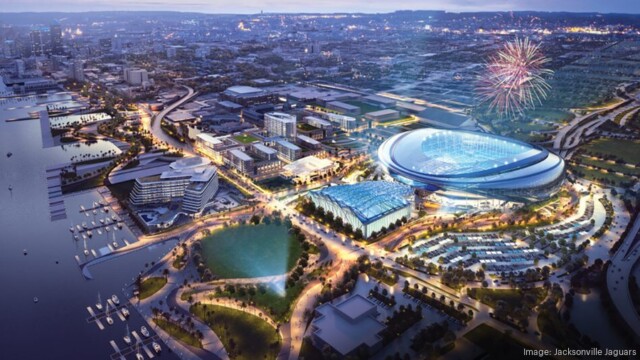On Tuesday night, the Jacksonville City Council approved a deal between the Jaguars and the city to renovate EverBank Stadium for $1.4 billion by a vote of 14 to 1.
This moves the Jaguars one step closer to ensuring the franchise’s long-term viability, with the last obstacle being approval by 24 of the NFL’s 32 owners during the league’s October meetings in Atlanta.
If it occurs, the building will begin following the team’s 2025 season and will be completed by 2028.
“This is a historic day for our city,” Jacksonville Mayor Donna Deegan said. “As I told the council, this is what we can do when we all row together and work toward a common objective.
“Monumental.”I believe it is generational progress.”
The Jaguars and the city have agreed to contribute $625 million each to the restoration, but the city has also committed to spend $150 million over the next two seasons for stadium upkeep and repairs in preparation for construction. This implies that the city will be liable for 55% of the overall expenditure.
Furthermore, the deal requires Jaguars owner Shad Khan to bear the cost overruns for the restoration as well as 80.4% of game-day expenditures.
The city and the Jaguars have reached an agreement that will see the stadium renovated and reopened for 30 years. The pact also includes a non-relocation clause, which will end the 15 years of speculation about the small-market club moving. There is also a stipulation that restricts the Jaguars to one home game per year in London unless the NFL requires them to play an extra overseas game once every four seasons — and only during seasons when the club has nine home games (every odd year).
Since 2013, the Jaguars have played a yearly home game in London (with the exception of 2020 due to the pandemic). Last season, they played successive games in London, although only once as the home team. They plan to do so again in 2024.
Jaguars president Mark Lamping said that the club began the process of working toward a new or refurbished stadium in 2016 and that Tuesday night’s decision marked the conclusion of eight years of labor.
“The reason we started on it so early is that we studied those cities that had problems with their teams,” according to Lamping. “Unfortunately, several communities have lost their NFL franchises, and they all have one thing in common. It’s a little market. The club does not have a contract with the city, and they have an unsolved stadium issue. Shad’s pledge from the start was to do all we could to prevent it from happening in Jacksonville.
“We’ve spent a significant lot of time and money, especially over the past four years, and we’re happy that we were able to achieve that objective. Shad and the community expressed a desire to keep the Jaguars in northeast Florida for future generations this evening. We made that ambition a reality due to the mayor and her staff.”
The restored stadium would be comparable to SoFi Stadium in Inglewood, California, with a covered canopy covering each seat, lowering the temperature by 15 degrees. The capacity for Jaguars games would be 63,000, but seating may be increased to 70,000 or more to handle the annual Florida-Georgia game as well as other future athletic events and concerts.
The Jaguars will play at EverBank Stadium with a lower capacity in 2026 before moving on to other venues for the 2027 season. After deciding against playing at Daytona International Speedway due to a lack of infrastructure, the Jaguars have two options: Ben Hill Griffin Stadium on the University of Florida campus in Gainesville and Camping World Stadium in Orlando.


